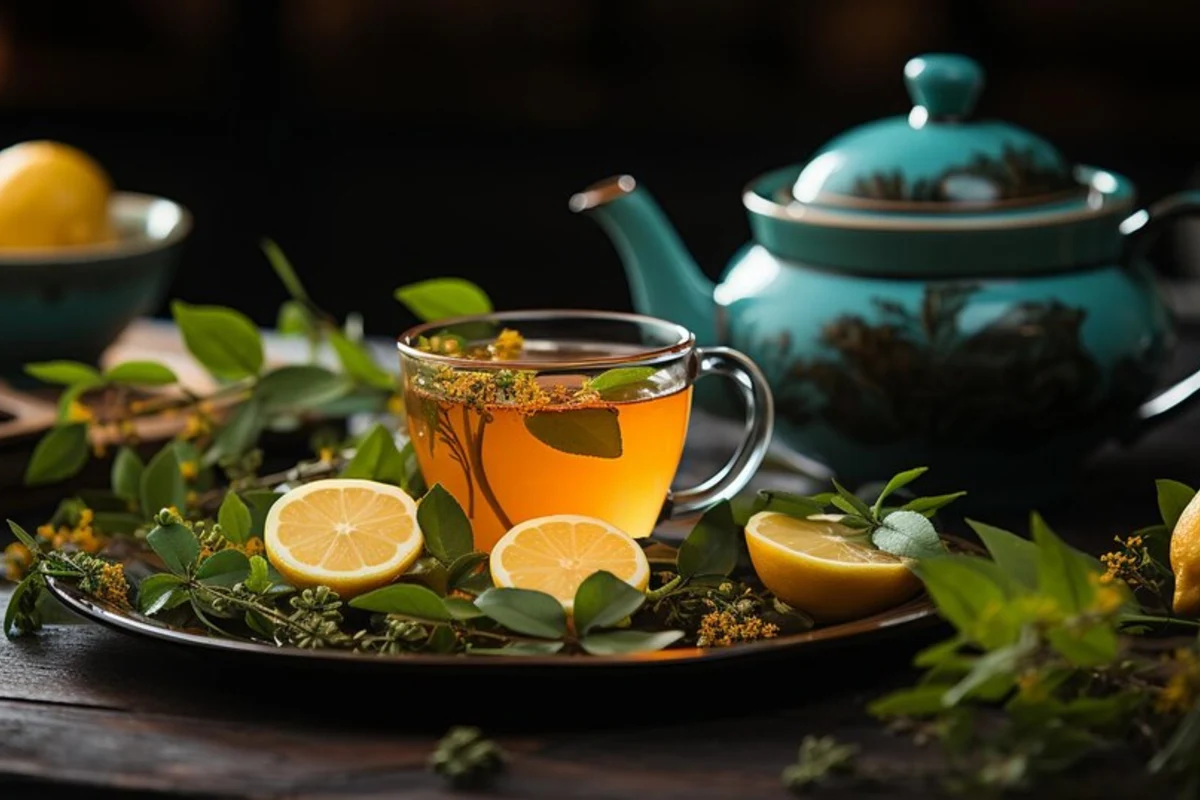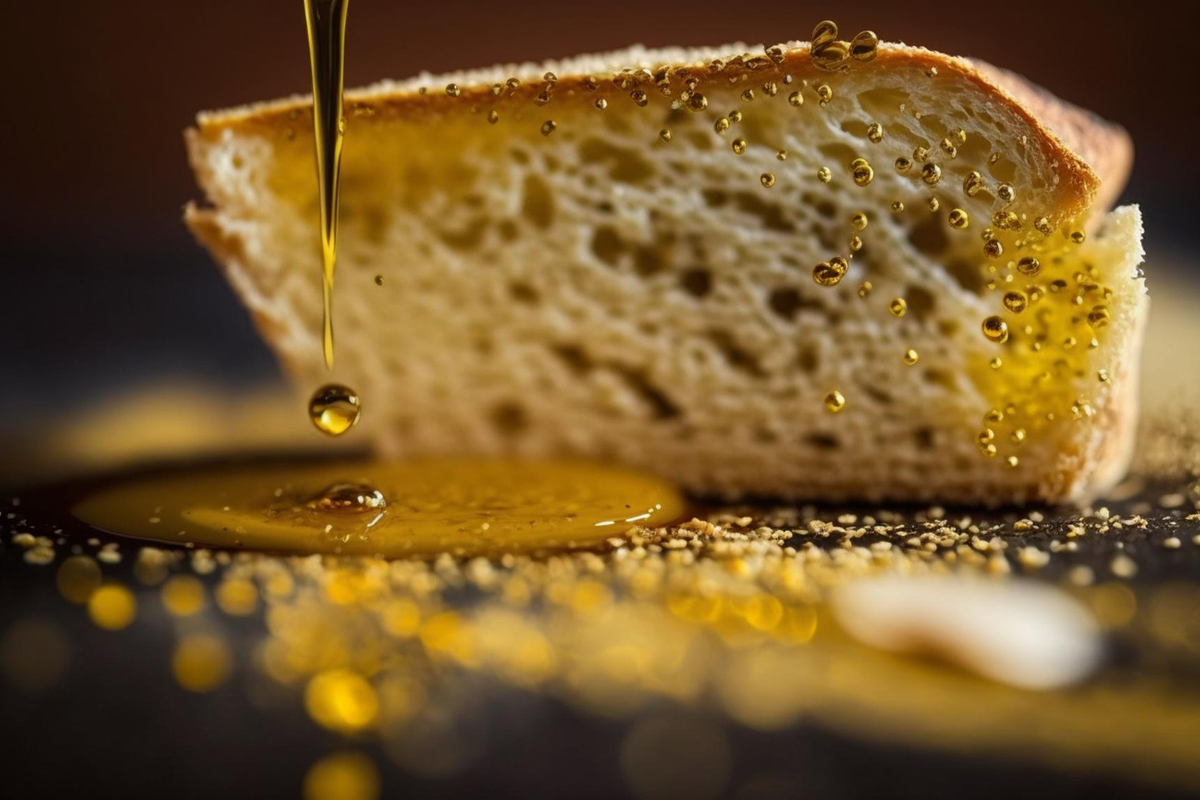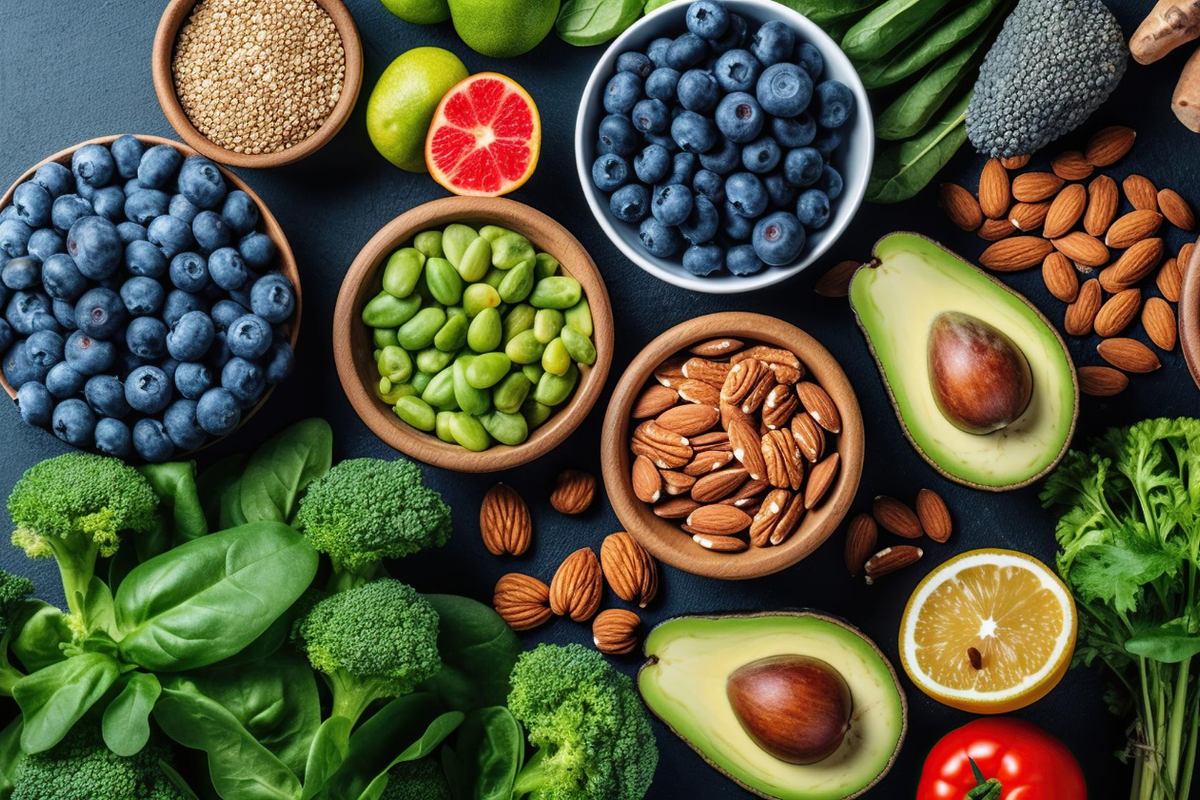Women have been harnessing the power of tea to balance hormones naturally for centuries, and recent scientific studies validate the effectiveness of certain herbal teas in hormone regulation. If your hormones are causing trouble, fear not – there’s a tea for that! Join me on a journey through the world of herbal teas and discover the best companions for hormone balance.

If you’re looking for natural ways to balance your hormones, you might want to consider adding some herbal teas to your daily routine. Herbal teas are not only delicious and soothing, but they can also provide various health benefits for women going through hormonal changes, such as menopause, PMS, or fertility issues. In this blog post, we’ll explore some of the best herbal teas for hormone balance and how they can help you feel better.
Exploring Herbal Teas for Hormone Balance
Ashwagandha Tea
Ashwagandha is a powerful adaptogenic herb that helps your body cope with stress and modulates the production of stress hormones, such as cortisol. Cortisol is known to interfere with other hormones, such as insulin, estrogen, progesterone, and testosterone, and cause hormonal imbalances. By lowering cortisol levels, ashwagandha can improve insulin sensitivity, regulate blood sugar levels, enhance mood and cognitive function, and boost fertility. Ashwagandha can also increase the levels of DHEA, a precursor hormone that converts into estrogen and testosterone, and thus support hormone balance in both men and women. Ashwagandha is especially beneficial for women going through menopause, as it can alleviate hot flashes, insomnia, anxiety, and depression.
To make ashwagandha tea, you can use dried ashwagandha root or powder. Boil one cup of water and add one teaspoon of ashwagandha root or powder. Simmer for 10 minutes and strain. You can add honey or milk to taste. Drink one to two cups a day for best results.
Vitex/Chasteberry Tea
Vitex, also known as chasteberry, is a herb that has been used for centuries to treat various female reproductive issues, such as PMS, infertility, irregular periods, and menopause. Vitex works by stimulating the pituitary gland, which regulates the production of hormones in the body. Vitex can help balance the levels of estrogen and progesterone, which are often out of sync in women with hormonal problems.
Vitex can also increase the production of luteinizing hormone (LH), which triggers ovulation and supports the luteal phase of the menstrual cycle. The luteal phase is the time between ovulation and menstruation when progesterone levels are high. A short or deficient luteal phase can cause infertility or miscarriage. By extending and strengthening the luteal phase, vitex can improve fertility and pregnancy outcomes. Vitex can also reduce PMS symptoms, such as mood swings, breast tenderness, bloating, and cramps.
To make vitex tea, you can use dried vitex berries or extract. Boil one cup of water and add one teaspoon of vitex berries or one dropper of vitex extract. Steep for 10 minutes and strain. You can add honey or lemon to taste. Drink one cup a day in the morning before breakfast for at least three months for best results.
Red Clover Tea
Red clover is a plant that contains phytoestrogens, which are plant compounds that mimic the effects of estrogen in the body. Phytoestrogens can help balance estrogen levels in women who have low estrogen due to menopause or other reasons. Red clover can also bind to estrogen receptors in the body and block the effects of excess estrogen in women who have high estrogen due to estrogen dominance or other reasons. By modulating estrogen levels, red clover can ease menopausal symptoms, such as hot flashes, night sweats, vaginal dryness, and osteoporosis. Red clover can also support cardiovascular health by lowering blood pressure and cholesterol levels.
To make red clover tea, you can use dried red clover flowers or leaves. Boil one cup of water and add one tablespoon of red clover flowers or leaves. Steep for 10 minutes and strain. You can add honey or mint to taste. Drink two to three cups a day for best results.
Yarrow Tea
Yarrow is a herb that has been used for centuries to treat various ailments, such as wounds, infections, inflammation, and bleeding. Yarrow has also been recognized for its ability to regulate the menstrual cycle and balance hormones in women. Yarrow contains flavonoids that have estrogenic effects on the body and can help increase estrogen levels in women who have low estrogen due to menopause or other reasons. Yarrow can also stimulate blood flow to the uterus and ovaries and promote ovulation and menstruation in women who have irregular periods or amenorrhea (absence of periods). Yarrow can also reduce menstrual bleeding and cramping in women who have heavy or painful periods.
To make yarrow tea, you can use dried yarrow flowers or leaves. Boil one cup of water and add one teaspoon of yarrow flowers or leaves. Steep for 10 minutes and strain. You can add honey or ginger to taste. Drink one to three cups a day for best results.
Black Cohosh Tea
Black cohosh is a herb that has been used by Native Americans for centuries to treat various female reproductive issues, such as menopause, PMS, infertility, and labor. Black cohosh is believed to have phytoestrogenic and anti-inflammatory properties that can help balance estrogen levels and reduce inflammation in the body. Black cohosh can also act on the hypothalamus and pituitary gland, which regulate the production of hormones in the body. Black cohosh can help alleviate menopausal symptoms, such as hot flashes, night sweats, mood swings, insomnia, and vaginal dryness. However, the evidence for black cohosh’s effectiveness is inconclusive and more research is needed.
To make black cohosh tea, you can use dried black cohosh root or extract. Boil one cup of water and add one teaspoon of black cohosh root or one dropper of black cohosh extract. Simmer for 10 minutes and strain. You can add honey or lemon to taste. Drink one cup a day for best results.
Lady’s Mantle Tea
Lady’s mantle is a herb that has been used for centuries to treat various female reproductive issues, such as heavy bleeding, cramps, fibroids, endometriosis, and infertility. Lady’s mantle works by stimulating the production of progesterone, which is often low in women with hormonal imbalances. Progesterone is essential for maintaining a healthy menstrual cycle, pregnancy, and menopause. Lady’s mantle can also reduce menstrual bleeding and cramping by constricting blood vessels and reducing inflammation in the uterus. Lady’s mantle has also been shown to have anti-inflammatory and antioxidant properties that can protect the body from oxidative stress and chronic diseases.
To make lady’s mantle tea, you can use dried lady’s mantle leaves or extract. Boil one cup of water and add one teaspoon of lady’s mantle leaves or one dropper of lady’s mantle extract. Steep for 10 minutes and strain. You can add honey or cinnamon to taste. Drink one to three cups a day for best results.
Holy Basil Tea
Holy basil, also known as tulsi, is a sacred herb in Ayurveda that has been used for thousands of years to treat various physical and mental health issues. Holy basil is an adaptogen that helps the body cope with stress and modulates the production of stress hormones, such as cortisol. Cortisol can interfere with other hormones, such as insulin, estrogen, progesterone, and thyroid hormones, and cause hormonal imbalances. By lowering cortisol levels, holy basil can improve insulin sensitivity, regulate blood sugar levels, enhance mood and cognitive function, and support thyroid health. Holy basil can also regulate blood pressure, cholesterol levels, and inflammation in the body.
To make holy basil tea, you can use fresh or dried holy basil leaves or extract. Boil one cup of water and add a handful of fresh holy basil leaves or one teaspoon of dried holy basil leaves or one dropper of holy basil extract. Steep for 10 minutes and strain. You can add honey or lemon to taste. Drink two to three cups a day for best results.
Hibiscus Tea
Hibiscus tea is a refreshing and delicious drink that has various health benefits for women with hormonal issues. Hibiscus tea contains anthocyanins that have anti-inflammatory and antioxidant properties that can protect the body from oxidative stress and chronic diseases. Hibiscus tea can also support weight loss by increasing metabolism and reducing appetite. Hibiscus tea can also improve blood sugar metabolism by inhibiting the enzyme that breaks down starch into glucose. Hibiscus tea can also ease menopausal symptoms by providing phytoestrogens that can balance estrogen levels in the body.
To make hibiscus tea, you can use dried hibiscus flowers or extract. Boil one cup of water and add one tablespoon of hibiscus flowers or one dropper of hibiscus extract. Steep for 10 minutes and strain. You can add honey or mint to taste. Drink two to three cups a day for best results.
Fenugreek Tea
Fenugreek is a popular herb in Ayurvedic medicine that has been used for centuries to treat various health issues, such as diabetes, digestive problems, inflammation, and lactation. Fenugreek contains phytoestrogens that can help balance estrogen levels in women who have low estrogen due to menopause or other reasons. Fenugreek can also alleviate menopausal symptoms, such as hot flashes, night sweats, mood swings, and vaginal dryness. Fenugreek can also improve insulin resistance by increasing the production of insulin and enhancing its uptake by cells.
To make fenugreek tea, you can use dried fenugreek seeds or powder. Boil one cup of water and add one teaspoon of fenugreek seeds or powder. Simmer for 10 minutes and strain. You can add honey or lemon to
If you’re looking for natural ways to balance your hormones, you might want to consider adding some herbal teas to your daily routine. Herbal teas are not only delicious and soothing, but they also have various benefits for your hormonal health. Here are some of the best herbal teas for women and how they can help you achieve hormonal harmony.
Oatstraw Tea
Oatstraw, a nervine rich in vitamins and minerals, supports the nervous system, reduces anxiety, and improves sleep. It’s a natural way to support hormone health, especially for women who are stressed, tired, or have adrenal fatigue. Oatstraw tea can also help lower blood pressure and cholesterol levels, which are important for cardiovascular health. To make oatstraw tea, steep one teaspoon of dried oatstraw in a cup of boiling water for 10 minutes. You can add honey or lemon to taste.
Motherwort Tea
Used for stress relief and calming, motherwort improves heart health, regulates menstruation, and acts as a uterine tonic. It’s beneficial for menopausal symptoms, such as hot flashes, mood swings, and insomnia. Motherwort tea can also help ease menstrual cramps, irregular periods, and heavy bleeding. To make motherwort tea, steep one teaspoon of dried motherwort in a cup of boiling water for 10 minutes. You can add honey or lemon to taste.
Dong Quai Tea
Known as the female ginseng, dong quai may help lower blood sugars, improve insulin resistance, and treat menopause symptoms. Dong quai tea can also balance estrogen levels, stimulate blood circulation, and enhance fertility. However, dong quai should not be used during pregnancy or menstruation, as it may cause bleeding or miscarriage. To make dong quai tea, steep one teaspoon of dried dong quai root in a cup of boiling water for 10 minutes. You can add honey or lemon to taste.
Red Raspberry Leaf Tea
Dubbed a woman’s herb, red raspberry leaf supports hormone balance with vitamins and minerals. It reduces PMS symptoms, regulates periods, and provides various benefits for pregnant and breastfeeding women. Red raspberry leaf tea can also strengthen the uterus, prevent miscarriage, ease labor pains, and increase milk supply. To make red raspberry leaf tea, steep one teaspoon of dried red raspberry leaves in a cup of boiling water for 10 minutes. You can add honey or lemon to taste.
Milk Thistle Tea
Milk thistle, a liver cleanser, detoxifies the liver, improves insulin resistance, and may increase milk production. Milk thistle tea can also help balance estrogen levels by preventing excess estrogen from being recycled in the liver. However, milk thistle may interact with some medications or have side effects such as nausea or diarrhea. Contraindications exist, so consult a healthcare provider before use. To make milk thistle tea, steep one teaspoon of crushed milk thistle seeds in a cup of boiling water for 10 minutes. You can add honey or lemon to taste.
Green Tea
Green tea aids hormone balance by reducing stress hormone cortisol, improving mood, and offering antioxidant benefits. Green tea can also boost metabolism, lower blood sugar levels, and protect against breast cancer. Matcha green tea is a popular and healthful choice that contains more antioxidants and nutrients than regular green tea. To make green tea, steep one teaspoon of green tea leaves or matcha powder in a cup of hot water for 2 to 3 minutes. You can add honey or lemon to taste.
Dandelion Tea
Dandelion tea, a liver tonic, supports estrogen metabolism and improves blood sugar metabolism. Dandelion tea can also help flush out excess water and toxins from the body, reducing bloating and inflammation. Every part of the dandelion is edible and can be made into a delicious tea. To make dandelion tea, steep one teaspoon of dried dandelion leaves or roots in a cup of boiling water for 10 minutes. You can add honey or lemon to taste.
Shatavari Tea
Shatavari, an adaptogenic herb, regulates stress response and treats hormone imbalances, including PCOS. Shatavari tea can also increase prolactin for breastfeeding mothers, enhance libido and fertility for both men and women, and relieve menopausal symptoms such as vaginal dryness and hot flashes. To make shatavari tea, steep one teaspoon of dried shatavari root in a cup of boiling water for 10 minutes. You can add honey or lemon to taste.
Spearmint Tea
Research suggests that spearmint tea may reduce androgen levels in women with PCOS, helping alleviate hormonal imbalances associated with the condition. Spearmint tea can also help lower blood pressure and cholesterol levels, improve digestion and memory, and prevent acne and hirsutism. To make spearmint tea, steep one teaspoon of fresh or dried spearmint leaves in a cup of boiling water for 5 to 10 minutes. You can add honey or lemon to taste.
Stinging Nettle Tea
Rich in vitamins and minerals, stinging nettle benefits thyroid function, lowers blood sugar levels, and may help regulate menstruation. Stinging nettle tea can also reduce inflammation, allergies, and joint pain, as well as improve hair and skin health. To make stinging nettle tea, steep one teaspoon of dried stinging nettle leaves in a cup of boiling water for 10 minutes. You can add honey or lemon to taste.
These are some of the best herbal teas for women who want to balance their hormones naturally. However, before you start drinking any herbal tea, make sure to consult your doctor or a qualified herbalist to avoid any potential interactions or complications. Also, remember that herbal teas are not a substitute for a healthy diet and lifestyle, but rather a complementary addition to your wellness routine.
Conclusion
In the pursuit of hormone health, herbal teas offer a holistic approach. Whether combating menopausal symptoms, PMS, or hormonal imbalances, these teas provide natural support. Remember, consult your healthcare provider before adding any supplements to your routine.
Frequently Asked Questions (FAQs)
- Are these teas safe for everyone?
- Answer: While generally safe, it’s crucial to consult your healthcare provider, especially if pregnant, breastfeeding, or on medications.
- How often should I drink these teas?
- Answer: Daily consumption is generally safe, but moderation is key. Listen to your body and adjust accordingly.
- Can herbal teas replace medication for hormonal issues?
- Answer: Herbal teas can complement but not replace medication. Consult your healthcare provider for personalized advice.
- Are there any side effects of these teas?
- Answer: While rare, some teas may have contraindications. Always monitor your body’s response and seek professional advice if needed.
- Can men benefit from these teas too?
- Answer: Absolutely! While often discussed in the context of women’s health, these teas can offer various benefits for men as well.








